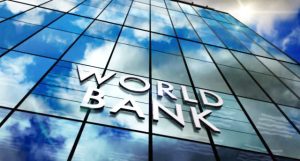Onome Amuge
Nigeria’s inflation, a persistent economic headache, is projected to average 22.1 per cent in 2025, the World Bank has projected. The Washington-based lender, in its latest Nigeria Development Update (NDU) unveiled in Abuja on Monday, noted that the Central Bank of Nigeria’s (CBN) tight monetary policy stance is beginning to anchor inflation expectations and rebuild macroeconomic confidence.
The biannual report, titled “Building Momentum for Inclusive Growth,” acknowledged improvements in Nigeria’s economic indicators, including growth, revenue generation, and fiscal balance. However, it cautioned that price pressures remain stubbornly high.
“Inflation has remained high and sticky but is expected to fall to an annual average of 22.1% in 2025, as a sustained tight stance firmly establishes monetary policy credibility and dampens inflationary expectations,” the report stated. The high inflation was attributed to the removal of fuel subsidies, exchange rate unification, elevated logistics and energy costs, and disruptions to food supply chains.
While recent monetary tightening by the CBN is showing signs of moderating inflation momentum, the report highlighted the impact of Nigeria’s recent rebasing of its Consumer Price Index (CPI), which shifted the base year to 2024 from 2009.
The rebasing saw inflation fall sharply to 24.48 per cent in January 2025, down from 34.80 per cent in December. However, the rate has since shown volatility, slowing to 23.18 per cent in February before climbing to 24.23 per cent in March.
Despite the ongoing inflation challenges, the NDU pointed to a strong economic expansion, with Nigeria’s economy growing by 4.6 per cent year-on-year in the final quarter of 2024, pushing full-year growth to 3.4 per cent, the strongest non-COVID performance in a decade, according to the World Bank report.
Strengthened by an increase in consolidated government revenues, from N16.8 trillion (7.2 per cent of GDP) in 2023 to an estimated N31.9 trillion (11.5 per cent of GDP) in 2024, Nigeria’s fiscal deficit narrowed considerably from 5.4 per cent of GDP in 2023 to 3.0 per cent in 2024.
The World Bank believes this improving macroeconomic outlook presents Nigeria with a historic opportunity to reallocate public spending towards development priorities.
“Nigeria has made impressive strides to restore macroeconomic stability,” remarked Taimur Samad, acting World Bank country director for Nigeria.
“With the improvement in the fiscal situation, Nigeria now has a historic opportunity to improve the quantity and quality of development spending; investing more in human capital, social protection, and infrastructure,” he added.
Samad also stressed the need to shift public resource allocation away from unsustainable patterns to address the country’s development deficits.
The NDU advocated for a private sector-led growth strategy, emphasising the importance of improving infrastructure, enhancing access to finance, fostering competition, and implementing reforms in key productive sectors to stimulate job creation and inclusive development.









